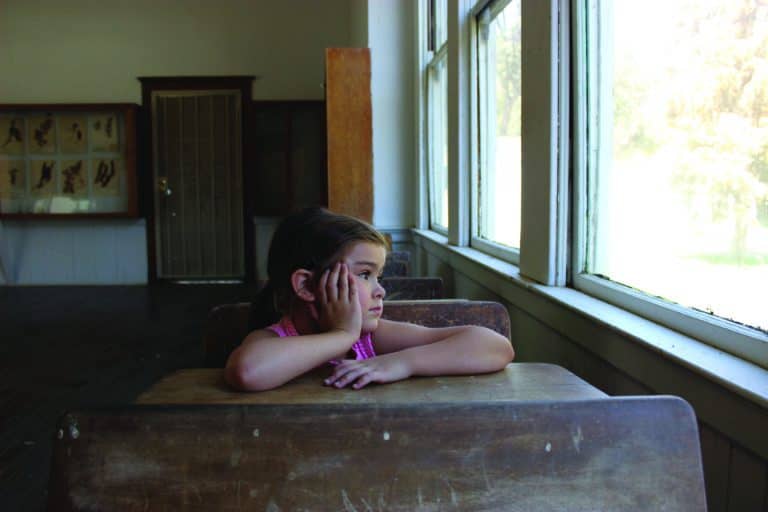Gifted: the double-edged sword

This is the first in a series of articles on giftedness, how to identify it, how it manifests, and how to manage it.
The bell curve that establishes what is developmentally normal for school children helps teachers and other professionals to direct extra money, resources, and time to students who are below the average, on the negative side of the bell curve. But what about those who present above that curve, who are considered “gifted”? Many teachers consider that these children should be OK given they are developmentally advanced in one way or another. However, this is far from the truth of what it really means to lie on the positive side of the curve. There is a real lack of focus and understanding about the characteristics of a gifted child and how to teach and manage gifted children.
Nobody expects a child who is three standard deviations below the average to act, think and understand the world in the same way the average one does. However, everyday people expect that from kids who are three standard deviations above the average. Whilst most get that one or three standard deviations below the norm makes a difference in daily living, on the other side of the curve we are all lumped together. Empathy is the result of talking about a deficiency. The other side of the curve is met with comparison and even contempt. I struggle everyday with who I am.
J. – Extreme low self-esteem/Highly gifted
How do you know if a child is gifted?
I meet many parents in my office who exclaim that their child is driving them insane through their inability to follow directions and focus on even the most basic tasks, such as brushing their teeth without getting sidetracked, for example, by building something in their room. Parents will discuss their child’s high levels of anxiety, and how they ask profound questions about life and death. Many parents diagnose these children with ADHD or another well known condition. However, most of these characteristics lead me to write at the top of my notes the question, “gifted?”.
Behavioural characteristics of gifted children:
- Spontaneity and impulsivity
- Intense focus on passions and a resistance to changing activities when engrossed in own interests
- Highly energetic with little need for sleep or downtime
- Insatiable curiosity and questioning nature
- Strong determination and perseverance
- Frustration, particularly when unable to meet standards of performance or high expectations imposed by self or others
- Non-stop talking
- Unusual emotional depth and intensity
- Sensitivity and empathy
- Heightened self-awareness, feelings of being different
- Need for consistency between abstract values and personal actions
- Advanced sense of moral judgement, idealism and justice
What IQ measurement is considered gifted?
Based on full scale IQs, such as the Weschler Intelligence Scales (WPPSI-IV; WISC-V; WAIS-IV), it is generally accepted that an IQ of 120 and above means “bright”, 130 and above is “gifted”, 145 and above is “highly gifted”, and 160 and above is “exceptionally gifted”. Often these scores are influenced by a heterogenous profile. One or two scores may be lower, affecting the score.
Learning challenges for gifted children
Giftedness can lead to conflict in the classroom for many reasons. Gifted children get bored with routine tasks, resist changing away from interesting topics or activities, are overly critical of themselves and others, impatient with failure, and perfectionistic. They disagree vocally with others and argue with teachers.
They can make jokes or puns at times adults consider inappropriate. Sometimes they can be so emotionally sensitive and empathetic that it seems like an overreaction, and may get angry or cry when things go wrong or seem unfair. They ignore details and turn in messy work. They reject authority, are non-conforming and stubborn. In cooperative learning situations, they dominate or withdraw. They are highly sensitive to environmental stimuli such as lights or noises.
Independent Learner
A gifted child is an independent learner and may choose not to complete all requirements of an assignment because they don’t see the point of them. They also take their own approach to problem-solving. They can be side-tracked by an idea they find more interesting than their homework. Giftedness comes along with what is known as the autonomous factor, which means that you’re not interested in whether other people see the value of what you’re doing, but more in how important it seems to you.
I stopped handing in my schoolwork. I would go home and work on projects but then never be happy with what I wrote. These were not things I wanted to write, they were things I was told to write, to fulfill the teacher’s checkboxes so that their kids would do well, and she would look good. I wasn’t exploring my creativity or what I really thought. I stopped going to school and I stopped caring. No one understood me anyway and what was the point of all of this nonsense.
J. (16 years) – Highly gifted/clinical depression
The gifted or stupid paradox
A classroom can be a torturous place for gifted children as they are required to conform to educational norms. When unrecognized, gifted children can suffer more or just as much as kids with a recognized “difficulty”, and many gifted children actually do not get top grades. The classroom can feel like a prison to these children, to the extent that they drop out of school or become so severely depressed or anxious that they are hospitalized.
Paradoxically, gifted children often think they are “stupid”
If, for example, they are twice exceptional (E2), it may cause problems or deficits like dysgraphia, leading to struggles with writing and putting thoughts on paper. In the younger years this might mean they see others progressing much faster, and start internalizing that they are “less able”. In “Growing Up Gifted”, Barbara Clark (1979) reported on a young female student had spent 18 years believing she was not intelligent because she asked more questions than her peers in class. Later, in Clark’s university class, when the characteristics of the gifted were discussed, the woman strongly identified with the description. During a conversation with her parents, the student found out that she had an IQ of 165. School personnel had advised her parents not to discuss her extraordinary IQ with her, resulting in her low level of academic self-esteem.
Teachers didn’t know what to do with me, I would joke around in class, disturb all the other kids. I would lose things all the time and not follow directions; I constantly annoyed teachers. They thought I had ADHD, turns out I just wasn’t challenged enough. I moved up a grade. Most of the behaviour automatically stopped because I was challenged.
K. (12 years old) – Gifted/ dysgraphia
Social differences in gifted children
Gifted children present a unique social profile, because many – but not all – aspects of their development occurs at an accelerated rate. Usually, the child’s intellectual development happens on a faster trajectory than their peers, while physical, social and emotional development does not (Tolan, 1999). This uneven development means gifted children can experience unique difficulties in various developmental areas, for example, resulting in a 6 year old child who functions as a 12 year old in academics, an 8 year old in sports and a 5 year old when he loses a game.
This uneven development experienced by gifted children explains why many of them may struggle to make or maintain friendships; kids expect others to think, act, and speak as they do, and the gifted child is left frustrated and questioning why they are not “normal” when they realize that this is not the case. Given how sensitive they are, they feel these social variabilities deeply.
Asynchronous Social Development
Asynchronous social development can be accentuated when gifted children are moved up a class, or even two, especially in the early tween years when a 10 or 11 year old is in class with 13 year olds whose maturity level and topics of interest are hugely divergent.
Given these challenges, many gifted children are more comfortable interacting with the teacher and other adults rather than peers, which can lead to bullying and further social isolation.
I struggle in school, I know I am popular, I always have so many kids around me. Regardless I feel so deeply empty, I feel so lonely. I am surrounded with people, but I always feel isolated and lonely. I know I think in ways that others don’t so I get bored with their conversations, but I just pretend. The only time I feel good is when one of my friends visits from abroad; we can talk for hours and days about everything and anything such as space and time and existence.
L. (16 years) – Highly gifted/ clinical depression

Social isolation in gifted girls
Social isolation is a common issue for gifted children in general, although often more so for girls, according to Dr. Kathleen Noble: “Not all, certainly, but… the majority of gifted women are introverted. And introversion by itself leads one to isolate.” This means that along with understanding what giftedness is all about, it’s important to understand introversion. Introverts get their energy from solitude. If space is not made for them to experience that solitude, it can put gifted girls at grave risk for developing conditions from depression to eating disorders as a way to create that personal space. A lot of gifted girls have intense radar, which can intensify introversion. These children will also have to work harder to find peers and friends than the average child.
I feel like there is something missing, I feel like I am different. I struggle with friendships and have one close one but not lots of friends. In school, I am at the top of the grade and feel like I need to do everything just so. However, I feel like I have no real control. I am amazing at sports. A lot of my attention goes into that. Regardless I feel isolated. I feel like I can control my eating.
N. (14 years) – Gifted / eating disorder
Knock on Effect on School Work
The characteristics outlined above represent an overview of why gifted children can struggle in school due to their unique academic, social, and emotional developmental issues. It is understandable, given the profile of the gifted child, why they remain misunderstood and often overlooked. In turn this often leads to severe mental health outcomes and unfulfilled academic potential. In our next article, we will discuss how educational professionals and parents can support these children to navigate school, social interactions, and other important aspects of life, and how this can lead to better outcomes for them and their families.
Author Bio
Dr. Laurence van Hanswijck de Jonge, PhD Child Development
https://www.laurencevanhanswijck.com/
Laurence van Hanswijck de Jonge is a Developmental Clinical Psychologist with a background in Neuropsychology who provides developmental and psychological assessments for English speaking children between the ages of 3 and 18 at KidsAbility in the Cayman Islands.
Find more articles like this here: www.internationalschoolparent.com/articles/
Want to write for us? You can submit an article for consideration here: www.internationalschoolparent.submittable.com
